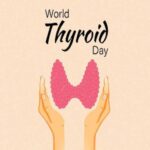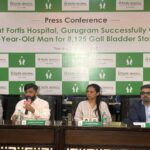- “Relevant stakeholders from the medical fraternity discuss the why and how of screening newborns for heart defects in a panel discussion in New Delhi
- The Government of Kerala is already working towards making CCHD screening mandatory in all their state-run hospitals”
New Delhi, May 29, 2018:
According to the National Family Health Survey, the infant mortality rate (IMR) in India stands at 34 per 1000 live births. About 10% of these infant deaths can be attributed to congenital heart diseases (CHD) alone. About 1.5 lakh infants are born with CHD in the country every year, a condition which can be detected with timely screening. Considering this, relevant stakeholders from HCFI, NNF and other institutions had come together to launch a campaign for formulating a national policy on making CCHD screening mandatory in all healthcare establishments in India. Dr Anne de-Wahl Granelli, a specialized biomedical scientist visiting India to raise awareness about CCHD screening was also part of the discussion.
The campaign followed a high-level meeting with Shri Manoj Jhalani, Additional Health Secretary, Ministry of Health and Family Welfare, Government of India. Masimo, a global leader in innovative non-invasive patient monitoring technologies is the technology partner for the initiative.
Current screening methods that include physical examination, fetal scan or a combination these two can only detect 72% of the cases. Various clinical studies have shown that addition of reliable pulse oximetry to screening protocols can potentially increase the detection rate to 92% which in the Indian context can approximately save about 52,000 babies. This will further have a direct impact on IMR.
Speaking during the discussion, Dr K K Aggarwal, President, Heart Care Foundation of India (HCFI), said, “Many newborns with critical CHD are symptomatic but not identified or diagnosed until after discharge. Such a delay in diagnosis increases the chance of frequent hospitalization and can cause mortality in the longer term. Newborn screening is thus an important strategy to ensure that no babies die due to lack of a proper screening mechanism. This issue requires the formulation of a national policy that will make screening for CCHD a priority even in primary healthcare establishments in the country. This can be made a reality if all relevant stakeholders join hands and support the cause.”
CCHD screening can also detect other birth defects including sepsis, respiratory disorders/lung pathology, persistent pulmonary hypertension, and transitional circulation. Countries that already have mandated and/or have adopted this screening methodology include USA, UAE, Saudi Arabia, Sweden, Norway, Sri Lanka, China, and Australia. USA already boasts of a 33% decline in infant deaths from CCHD in eight states due to timely screening.
Adding her inputs, Dr Anna Granelli, Head of Cardiology, NU Hospital Group, Trollhättan, Sweden said, “Pulse oximetry is a proven technology in detecting critical heart defects in infants. However, during my research, I gathered that not all pulse oximeters are the same. Institutions launching CCHD programmes should therefore choose a reliable technology after considering all aspects. Infants affected by CCHD can have poorer outcomes if there is a delay in diagnosis and treatment. Diagnosing these conditions before infants leave the hospital can prevent complications and more importantly, mortality. The time is appropriate and by sharing our experiences, I am sure we can bring about a positive development in this area in India as well and put in place a national policy for mandatory screening.”
Some signs of CCHD in infants include loss of healthy skin color; Cyanosis (a bluish tint to the skin, lips, and fingernails); rapid or troubled breathing, swelling or puffiness in the face, hands, feet, legs, or areas around the eyes; shortness of breath or tires easily during feedings; sweating around the head, especially during feeding; and poor weight gain.
“The current scenario in terms of the number of infants that die due to CCHD is grim. It further necessitates the need to implement a policy at the national level at the earliest. A pulse oximetry screening is not only inexpensive but takes less than 2 to 3 minutes per baby, with the benefits far outweighing the costs. The screening can even be carried out by an ASHA health worker with basic training. We are sure that this high-level meeting and discussion among relevant stakeholders will help us reach a consensus and get positive results,” said Dr BD Bhatia, President, The National Neonatology Forum.
Commenting on the subject, Dr Sitaraman Radhakrishnan, Director & HOD, Fortis Escorts Heart Institute, said “Pulse oximetry is a very simple and inexpensive tool to screen babies who are born with some critical CHD associated with low oxygen levels. Meticulous attention should be paid while analysing the oxygen readings taken by the instrument. Clear guidelines are available for this. However, there are many critical congenital heart diseases which may be associated with normal pulse oximetry results and screening should not be a substitute for a thorough clinical examination of the baby at the time of discharge from the nursery. It is also important that screening is also done during the infant’s first visit to the Paediatrician.”
“The primary benefit of newborn screening for CCHD with pulse oximetry is timely identification of infants with the condition prior to discharge from the hospital. Universal screening with Pulse Oximetry is better at detecting infants with critical CHD compared to physical examination alone. There is much to be gathered from the experience of other countries in making CCHD screening a priority.” opined Dr Smita Mishra, Pediatric Cardiologist, Jaypee Hospital.
The state of Kerala, few hospitals under the Government of Tamil Nadu, and other healthcare institutions such as the Manipal Group of Hospitals, St Martha’s Hospitals, Bangalore and CloudNine Hospitals have successfully adopted the screening mechanism. Others such as the Ram Manohar Lohia Hospital have recognized the importance of newborn CCHD screening and are working towards adopting it as a policy. All this makes it imperative to take it up on a national scale in India.







